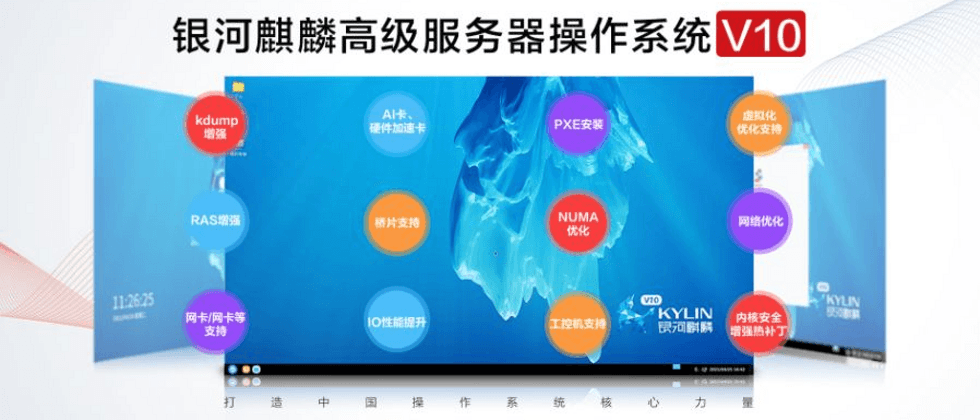Galaxy Kylin Advanced Server Operating System V10 is aimed at enterprise-level key business, adapting to the requirements of the reliability, security, performance, scalability and real-time performance of the host system in the era of virtualization, cloud computing, big data, and industrial Internet, according to CMMI level 5 Standard-developed new generation autonomous server operating system that provides endogenous security, cloud native support, in-depth optimization of domestic platforms, high performance, and easy management; the same source supports Feiteng, Loongson, Shenwei, Zhaoxin, Haiguang, Kunpeng and other independent platforms; It can support the construction of large-scale data center server high-availability clusters, load balancing clusters, distributed cluster file systems, virtualized applications and container cloud platforms, etc., and can be deployed in physical servers and virtualized environments, private clouds, public clouds, and hybrid cloud environments; Used in government, national defense, finance, education, finance and taxation, public security, auditing, transportation, medical treatment, manufacturing and other fields.
The company has a project that needs to deploy the system on kylinos . At the beginning, I still had a headache. I was afraid that various programs could not be installed and used. When I installed the server and used it, I found out that this is based on Centos, although which version is based on I don’t know, but it can be tested. So I found out that it is based on Centos8, and the system kernel version is 4.19. The problem is not big. Since it is based on Centos8, the program that can run on Centos8 is definitely also here. Can run, and then I started the pleasant (painful) journey of installing docker.
Configure Alibaba Cloud Centos8 image source
The reason to configure the mirror source of Centos8 is because some additional dependencies are needed when installing docker, and these dependencies are not in the official source of Kylin.
curl -o /etc/yum.repos.d/CentOS-Base.repo https://mirrors.aliyun.com/repo/Centos-8.repoConfigure Alibaba Cloud Docker image source
yum-config-manager --add-repo https://mirrors.aliyun.com/docker-ce/linux/centos/docker-ce.repo
sed -i 's+download.docker.com+mirrors.aliyun.com/docker-ce+' /etc/yum.repos.d/docker-ce.repoDefine yum variables & modify repo
Modify centos and Docker repo file $releasever is centos_version , because the server operating system unicorn V10 in $releasever been modified to 10, and we need to use centos mirror source 8, if you do not replace, basically each address warehouse are It's 404.
echo "8" > /etc/yum/vars/centos_version
sed -i 's/$releasever/$centos_version/g' /etc/yum.repos.d/docker-ce.repo
sed -i 's/$releasever/$centos_version/g' /etc/yum.repos.d/CentOS-Base.repoEstablish yum cache
Nothing to say
yum makecacheView docker-ce version
yum list docker-ce --showduplicates | sort -r
docker-ce.x86_64 3:20.10.9-3.el8 docker-ce-stable
docker-ce.x86_64 3:20.10.8-3.el8 docker-ce-stable
docker-ce.x86_64 3:20.10.7-3.el8 docker-ce-stable
docker-ce.x86_64 3:20.10.6-3.el8 docker-ce-stable
docker-ce.x86_64 3:20.10.5-3.el8 docker-ce-stable
docker-ce.x86_64 3:20.10.4-3.el8 docker-ce-stable
docker-ce.x86_64 3:20.10.3-3.el8 docker-ce-stable
docker-ce.x86_64 3:20.10.2-3.el8 docker-ce-stable
docker-ce.x86_64 3:20.10.1-3.el8 docker-ce-stable
docker-ce.x86_64 3:20.10.12-3.el8 docker-ce-stable
docker-ce.x86_64 3:20.10.11-3.el8 docker-ce-stable
docker-ce.x86_64 3:20.10.10-3.el8 docker-ce-stable
docker-ce.x86_64 3:20.10.0-3.el8 docker-ce-stable
docker-ce.x86_64 3:19.03.15-3.el8 docker-ce-stable
docker-ce.x86_64 3:19.03.15-3.el8 @docker-ce-stable
docker-ce.x86_64 3:19.03.14-3.el8 docker-ce-stable
docker-ce.x86_64 3:19.03.13-3.el8 docker-ce-stableInstall docker
I need to install the docker-ce 19.03 version here, because I encountered an unknown permission problem when I started the container with the latest version 20.10, and the Kirin server operating system had relatively little information, so I could not find a corresponding solution, so I had to go back and forth. , Switch to the last stable version.
The 20.10 version error message is as follows:
docker: Error response from daemon: OCI runtime create failed: container_linux.go:318: starting container process caused "permission denied": unknown.
ERRO[0000] error waiting for container: context canceledLet's install version 19.03.
yum install docker-ce-19.03.15 docker-ce-cli-19.03.15 containerd.io -yStart docker
systemctl start docker
systemctl enable dockerStart hello-world for testing
root@localhost ~]# docker run hello-world
Unable to find image 'hello-world:latest' locally
latest: Pulling from library/hello-world
2db29710123e: Pull complete
Digest: sha256:2498fce14358aa50ead0cc6c19990fc6ff866ce72aeb5546e1d59caac3d0d60f
Status: Downloaded newer image for hello-world:latest
Hello from Docker!
This message shows that your installation appears to be working correctly.
To generate this message, Docker took the following steps:
1. The Docker client contacted the Docker daemon.
2. The Docker daemon pulled the "hello-world" image from the Docker Hub.
(amd64)
3. The Docker daemon created a new container from that image which runs the
executable that produces the output you are currently reading.
4. The Docker daemon streamed that output to the Docker client, which sent it
to your terminal.
To try something more ambitious, you can run an Ubuntu container with:
$ docker run -it ubuntu bash
Share images, automate workflows, and more with a free Docker ID:
https://hub.docker.com/
For more examples and ideas, visit:
https://docs.docker.com/get-started/Perfect to use -:)


**粗体** _斜体_ [链接](http://example.com) `代码` - 列表 > 引用。你还可以使用@来通知其他用户。